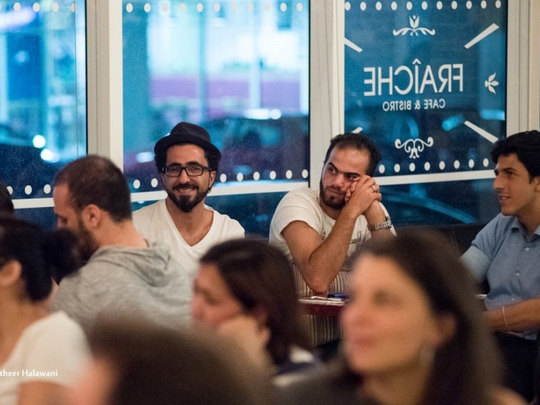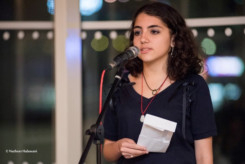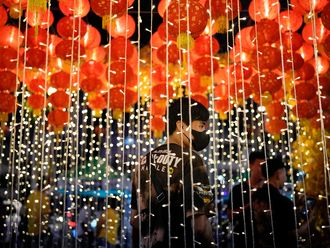
Poetry isn’t exactly what comes to mind when you think of Dubai. While a growing arts scene has slowly begun to change the concrete landscape of the city, literature by contrast, and especially poetry, is still limited to the odd festival hosted by corporates. “Poetry is the outlet for people to say in public what is known in private,” said Allen Ginsberg, the original “beat-generation” American poet of the 1950s, whose poem “Howl” became an anthem for denouncing capitalism and conformity. Copies of the poem were seized and tried for obscenity. For many poets across the world, their pen has been a means for propaganda, but for some it is simply a measure of trying to understand the world around them.
This is exactly what makes the Punch Poetry collective remarkable. Started in Dubai three years ago at BookMunch café near Safa Park by Lebanese-American poet Zeina Hashem Beck, the group has grown to support and showcase wonders of the written word through hosting “poetry nights”.
At one such event held recently at the Fraiche Café in JLT, guests were treated to diverse voices of performance poems that ranged in subjects from relationships, pet cats, hope for the world to pining for the homeland. Over the last three years, members have grown not just in numbers but in turning initial spectators to poet performers on these open mic nights. As the tempo of their words reverberates through the café, fellow writers click in approval and support, making this collective a circle of friends with a shared love for poetry.
Among those present at the last event was 14-year-old Nour, whose powerful and charged poem “Today” ended with the lines “One day, someday/we will choose/to take a stand/I choose today”. Her performance was met with thunderous applause, as was the poem on sexual violence from Afra Atiq, an erstwhile spectator who is now a regular.
Families and friends were present at the event, cheering on the performers. The staff at the café, who on regular days close at 6pm, were seen milling through the crowds until after 10, serving guests only during the breaks between each performance.
In this poetry collective, performance is central to the experience. “As a writer, performance helps iron out lots of wrinkles in the editing process. You don’t see the full strengths and weaknesses of a work until it is performed. Punch is a supportive group for performance with many different styles and levels — it sparks off new ideas as well,” says Czech national Anne Brechin, who first performed at Punch in November 2014. “I heard about them through someone at Corrupt Press and the Paris writing group ‘Paris Lit Up’. Zeina then contacted me when I arrived in Dubai.”
The immediate environment always informs a writer and Dubai is no different. While most poets who shared their work at the recent poetry night were not alluding to the city in their presented poems, most attest to the influence of the city and the people they have met here. “I’ve lived in Dubai for almost 10 years. I’ve certainly written a lot about the Middle East, having a closer view and greater insight. It’s also true that there are less significant poets here — I was previously in the UK — and this forced me to work harder on my self-criticism as feedback at a professional level is limited. That’s also why it’s good to have Zeina around,” says poet Frank Dullaghan, whose “Promenade des Anglais”, a response to the terror attack in Nice, France, was recently published in “Rattle”.
Zeina, whose collection of poems on Beirut titled “To Live in Autumn” won the 2013 Backwaters Prize, began showcasing her work in Dubai through another collective. “Before I began Punch, I had been part of ‘Poeticians’ started by Hind Shoufani, a Palestinian filmmaker and poet. However, there was no open mic event and the collections there were all curated. Punch, by contrast, seeks to provide amateur writers with a safe and creative environment in which to share their stories and for it to be more like a community.”
She takes on the role not just of organiser at Punch but of someone focused on promoting poetry writing in the city. “I conduct poetry classes at the French School in Dubai and there is a keen interest among young children for this form. My classes during the term include aspects of reading other texts, writing practice, where I provide detailed comments and feedback, followed by performance.”
Through Punch, some of her students such as Nour are graduating to performing before a large audience. Other amateur poets like her in the city have found a platform to showcase their work, receive feedback and improve their poetry skills. Members from the collective have been invited to attend sessions at the Emirates Airline Festival of Literature, such as the Desert Stanzas night for poets organised as a desert camp. Other avenues include performing at SIKKA at the Al Fahidi Historical Neighbourhood in March this year. Poets have also been present at the Dubai Poetry Slam, which gives local talent the opportunity to showcase their spoken word poetry, on the first Saturday night of every month.
As with other forms of writing, experienced poets suggest continuous reading to become better at the craft. “Read, read, read. But make sure they are quality poets. If you like something examine it to see why it works. Learn your craft this way. Continually redraft — you might think something you’ve just written is the best thing ever. It’s not. It takes a lot of work. Respect your craft and put in the work. Make sure your language is fresh, that your images are particular and achieved, that you pay attention to grammar and syntax, that you keep the writing tight, that you understand about how to start and finish — often the beginning of a poem is the third stanza; often the last stanza is not needed. This is where revision and rewriting comes in. We only improve when we are not satisfied with where we are,” says Dullaghan, who was a poetry judge at the Emirates Airline Festival of Literature in Dubai.
As readers slowly move away from prose and more so from poetry, the act of performing it can create a form of passion and direct communication that speaks to audiences easily. It is also the way that complex rhyming patterns of traditional forms, such as Nabiti poetry of the Gulf in the Bedouin dialect, are meant to be presented. It is a form chosen by His Highness Shaikh Mohammad Bin Rashid Al Maktoum, Vice-President and Prime Minister of the UAE and Ruler of Dubai, for his poetic work “Flashes of Verse”.
Spoken word poetry in the city may be doing the written form a favour in bringing more and more people to it. All poets attest to one key aspect during writing and performing: that of enjoying the whole process. In the end it should bring you joy.
Manika Dhama is an independent writer based in Dubai.













